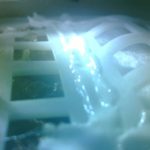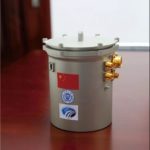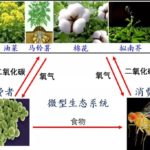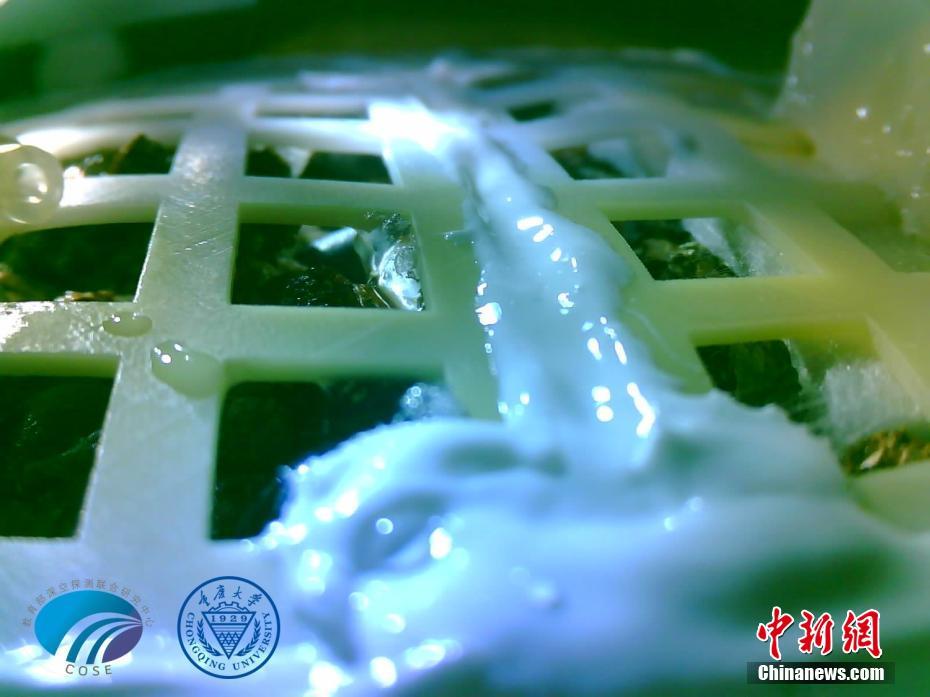
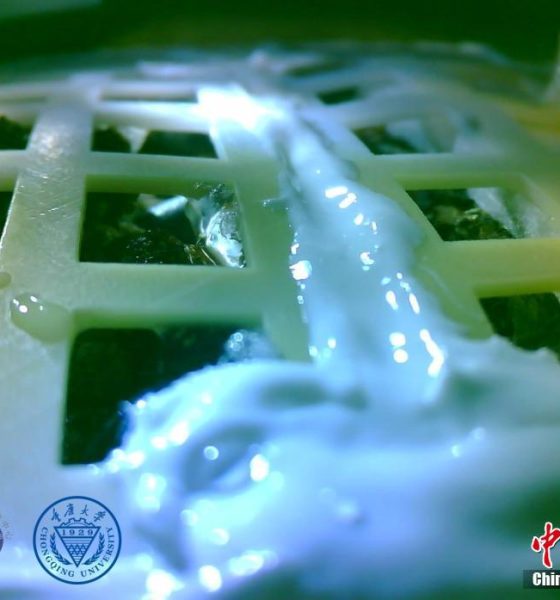
News
China successfully sprouts cotton seeds on the moon in a historic first
International discussions about sending humans to the Moon and Mars have brought many challenges waiting to be solved, and among them is food supply. While astronauts aboard the International Space Station (ISS) have been growing and consuming lettuce in space for a few years now, China has achieved a historic milestone by sprouting cotton seeds on the surface of the Moon. The news and corresponding photos were announced today. The seeds were part of a biosphere experiment which, if it performs as intended, will provide helpful data towards the development of sustainable agriculture in environments other than Earth.
China’s Chang’e 4 craft lunar lander arrived January 3, 2019 on the far side of the Moon, and part of its cargo included an aluminum alloy canister equipped with materials necessary for not only plant growth, but a self-sustaining biological environment lead by Chongqing University. Along with cotton seeds, the experiment included rapeseed, potato, and arabidopsis seeds, as well as fruit fly eggs and yeast to form a simple, tiny biosphere. A heat control system and two cameras were also part of the makeup.
Each member of the experiment was chosen with a bioprocess purpose in mind: Potato seeds represented a primary food supply for future space travelers (see also: The Martian), rapeseed could be used to produce oil, cotton seeds for clothing/supply fabric, the fruit fly would act as the consumer, and the yeast could regulate the oxygen and carbon dioxide being exchanged between the fly and the plants. The arabidosposis seeds contribute via its photosynthesis and could be a food source, but the plant is generally considered to be weed with a short growth cycle that could be useful for observation. The seeds and eggs were kept dormant until their lunar arrival, after which time they were watered by the lander. The germination of the cotton seeds alone has not yet been determined or specified by China’s space agency, the China National Space Administration (CNSA).
UPDATE: CNSA announced later on January 15, 2018 that the cotton sprouts are now dead. As the night period on the far side of the Moon set in, temperatures dropped to a level not sustainable in the biosphere canister.
- The cotton seed sprouts currently living on Earth as a comparable control. | Credit: CNSA/Chongqing University
- The canister containing China’s Chang’e lunar biosphere experiment on the Moon. | Credit: CNSA/Chongqing University
- A diagram of the types of seeds included in the Chang’e lunar biosphere experiment on the Moon. | Credit: CNSA/Chongqing University
Self-sustaining habitable environments for off-planet travel have been part of scientific research for decades, including a famous large-scale experiment conducted almost 30 years ago called Biosphere 2 (Earth is Biosphere 1). On September 26, 1991, 8 researchers were voluntarily sealed into a glass and steel structure on over 3 acres of land in Oracle, Arizona for two years, growing their own food and algae to sustain their living conditions, air included. It was supposed to be a step towards establishing space colonies, but unfortunately, low oxygen and food levels along with infighting (i.e., the human component) rendered the experiment a non-success.
While it’s certainly been determined that human interaction will be a big hurdle for long-term space faring missions, the engineering side of sustainable food production off-Earth is still facing challenges of its own and will continue to need development efforts. For example, astronauts on the ISS are currently working with an orbital agriculture experiment called Veggie which has recently faced issues with plant mold. While on Earth, we’ve become accustomed to the benefits provided by our planet’s natural biosphere – things like humidity, sunlight levels, water levels, etc. work in ways that are difficult to reproduce in a completely controlled environment like a spacecraft.
China’s mini biosphere experiment is another important step towards the long-term goal of sustainable off-planet environments. Given the struggles experienced during biosphere attempts on Earth, there might be a slow growth curve towards developing habitats that don’t need tons of resupply. This challenge is clearly acknowledged by the creators of the Chang’e lunar bio-canister. Professor Liu Hanlong, head of the experiment, stated in the seed sprout announcement, “We have given consideration to future survival in space. Learning about these plants’ growth in a low-gravity environment would allow us to lay the foundation for our future establishment of [a] space base.”

News
Tesla wins another award critics will absolutely despise
Tesla earned an overall score of 49 percent, up 6 percentage points from the previous year, widening its lead over second-place Ford (45 percent, up 2 points) to a commanding 4-percentage-point gap. The company also excelled in the Fossil Free & Environment category with a 50 percent score, reflecting strong progress in reducing emissions and decarbonizing operations.

Tesla just won another award that critics will absolutely despise, as it has been recognized once again as the company with the most sustainable supply chain.
Tesla has once again proven its critics wrong, securing the number one spot on the 2026 Lead the Charge Auto Supply Chain Leaderboard for the second consecutive year, Lead the Charge rankings show.
NEWS: Tesla ranked 1st on supply chain sustainability in the 2026 Lead the Charge auto/EV supply chain scorecard.
“@Tesla remains the top performing automaker of the Leaderboard for the second year running, and increased its overall score by 6 percentage points, while Ford only… pic.twitter.com/nAgGOIrGFS
— Sawyer Merritt (@SawyerMerritt) March 4, 2026
This independent ranking, produced by a coalition of environmental, human rights, and investor groups including the Sierra Club, Transport & Environment, and others, evaluates 18 major automakers on their efforts to build equitable, sustainable, and fossil-free supply chains for electric vehicles.
Tesla earned an overall score of 49 percent, up 6 percentage points from the previous year, widening its lead over second-place Ford (45 percent, up 2 points) to a commanding 4-percentage-point gap. The company also excelled in the Fossil Free & Environment category with a 50 percent score, reflecting strong progress in reducing emissions and decarbonizing operations.
Perhaps the most impressive achievement came in the batteries subsection, where Tesla posted a massive +20-point jump to reach 51 percent, becoming the first automaker ever to surpass 50 percent in this critical area.
Tesla achieved this milestone through transparency, fully disclosing Scope 3 emissions breakdowns for battery cell production and key materials like lithium, nickel, cobalt, and graphite.
The company also requires suppliers to conduct due diligence aligned with OECD guidelines on responsible sourcing, which it has mentioned in past Impact Reports.
While Tesla leads comfortably in climate and environmental performance, it scores 48 percent in human rights and responsible sourcing, slightly behind Ford’s 49 percent.
The company made notable gains in workers’ rights remedies, but has room to improve on issues like Indigenous Peoples’ rights.
Overall, the leaderboard highlights that a core group of leaders, Tesla, Ford, Volvo, Mercedes, and Volkswagen, are advancing twice as fast as their peers, proving that cleaner, more ethical EV supply chains are not just possible but already underway.
For Tesla detractors who claim EVs aren’t truly green or that the company cuts corners, this recognition from sustainability-focused NGOs delivers a powerful rebuttal.
Tesla’s vertical integration, direct supplier contracts, low-carbon material agreements (like its North American aluminum deal with emissions under 2kg CO₂e per kg), and raw materials reporting continue to set the industry standard.
As the world races toward electrification, Tesla isn’t just building cars; it’s building a more responsible future.
News
Tesla Full Self-Driving likely to expand to yet another Asian country
“We are aiming for implementation in 2026. [We are] doing everything in our power [to achieve this],” Richi Hashimoto, president of Tesla’s Japanese subsidiary, said.

Tesla Full Self-Driving is likely to expand to yet another Asian country, as one country seems primed for the suite to head to it for the first time.
The launch of Full Self-Driving in yet another country this year would be a major breakthrough for Tesla as it continues to expand the driver-assistance program across the world. Bureaucratic red tape has held up a lot of its efforts, but things are looking up in some regions.
Tesla is poised to transform Japan’s roads with Full Self-Driving (FSD) technology by 2026.
Richi Hashimoto, president of Tesla’s Japanese subsidiary, announced the ambitious timeline, building on successful employee test drives that began in 2025 and earned positive media reviews. Test drives, initially limited to the Model 3 since August 2025, expanded to the Model Y on March 5.
Once regulators approve, Over-the-Air (OTA) software updates could activate FSD across roughly 40,000 Teslas already on Japanese roads. Japan’s orderly traffic and strict safety culture make it an ideal testing ground for autonomous driving.
Hashimoto said:
“We are aiming for implementation in 2026. [We are] doing everything in our power [to achieve this].”
The push aligns with Hashimoto’s leadership, which has been credited for Tesla’s sales turnaround.
In 2025, Tesla delivered a record 10,600 vehicles in Japan — a nearly 90% jump from the prior year and the first time exceeding 10,000 units annually.
BREAKING 🇯🇵 FSD IS LIKELY LAUNCHING IN JAPAN IN 2026 🚨
Richi Hashimoto, President of Tesla’s Japanese subsidiary, stated: “We are aiming for implementation in 2026” and added that they are “doing everything in our power” to achieve this 🔥
Test drives in Japan began in August… pic.twitter.com/jkkrJLszXN
— Ming (@tslaming) March 5, 2026
The strategy shifted from online-only sales to adding 29 physical showrooms in high-traffic malls, plus staff training and attractive financing offers launched in January 2026. Tesla also plans to expand its Supercharger network to over 1,000 points by 2027, boosting accessibility.
This Japanese momentum reflects Tesla’s broader international expansion. In Europe, Giga Berlin produced more than 200,000 vehicles in 2025 despite a temporary halt, supplying over 30 markets with plans for sequential production growth in 2026 and battery cell manufacturing by 2027.
While regional EV sales faced headwinds, the factory remains a cornerstone for Model Y deliveries across the continent.
In Asia, Giga Shanghai continues to be recognized as Tesla’s powerhouse. China, the company’s largest market, saw January 2026 deliveries from the plant rise 9 percent year-over-year to 69,129 units, with affordable new models expected later this year.
FSD advancements, already progressing in the U.S. and South Korea, are slated for Europe and further Asian rollout, complementing plans to expand Cybercab and Optimus to new markets as well.
With OTA-enabled autonomy on the horizon and retail strategies paying dividends, Tesla is strengthening its footprint from Tokyo showrooms to Berlin assembly lines and Shanghai exports. As Hashimoto continues to push Tesla forward in Japan, the company’s global vision for sustainable, self-driving mobility gains traction across Europe and Asia.
News
Tesla ships out update that brings massive change to two big features
“This change only updates the name of certain features and text in your vehicle,” the company wrote in Release Notes for the update, “and does not change the way your features behave.”

Tesla has shipped out an update for its vehicles that was caused specifically by a California lawsuit that threatened the company’s ability to sell cars because of how it named its driver assistance suite.
Tesla shipped out Software Update 2026.2.9 starting last week; we received it already, and it only brings a few minor changes, mostly related to how things are referenced.
“This change only updates the name of certain features and text in your vehicle,” the company wrote in Release Notes for the update, “and does not change the way your features behave.”
The following changes came to Tesla vehicles in the update:
- Navigate on Autopilot has now been renamed to Navigate on Autosteer
- FSD Computer has been renamed to AI Computer
Tesla faced a 30-day sales suspension in California after the state’s Department of Motor Vehicles stated the company had to come into compliance regarding the marketing of its automated driving features.
The agency confirmed on February 18 that it had taken a “corrective action” to resolve the issue. That corrective action was renaming certain parts of its ADAS.
Tesla discontinued its standalone Autopilot offering in January and ramped up the marketing of Full Self-Driving Supervised. Tesla had said on X that the issue with naming “was a ‘consumer protection’ order about the use of the term ‘Autopilot’ in a case where not one single customer came forward to say there’s a problem.”
This was a “consumer protection” order about the use of the term “Autopilot” in a case where not one single customer came forward to say there’s a problem.
Sales in California will continue uninterrupted.
— Tesla North America (@tesla_na) December 17, 2025
It is now compliant with the wishes of the California DMV, and we’re all dealing with it now.
This was the first primary dispute over the terminology of Full Self-Driving, but it has undergone some scrutiny at the federal level, as some government officials have claimed the suite has “deceptive” names. Previous Transportation Secretary Pete Buttigieg was one of those federal-level employees who had an issue with the names “Autopilot” and “Full Self-Driving.”
Tesla sued the California DMV over the ruling last week.
